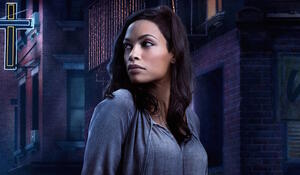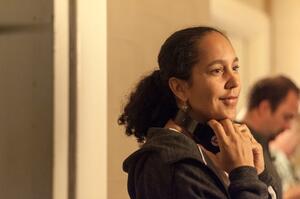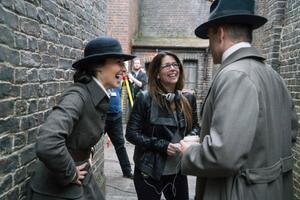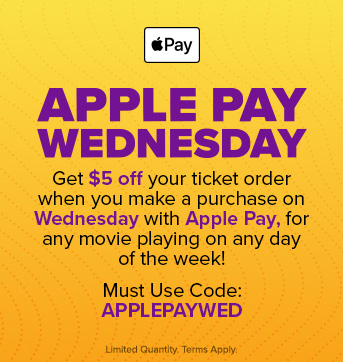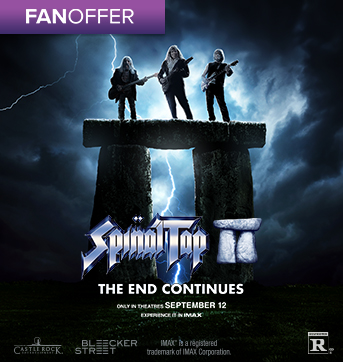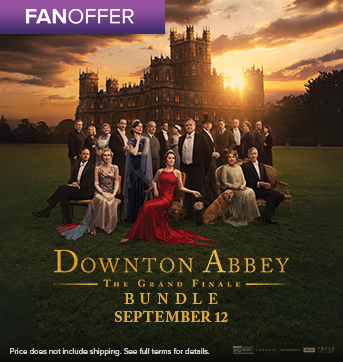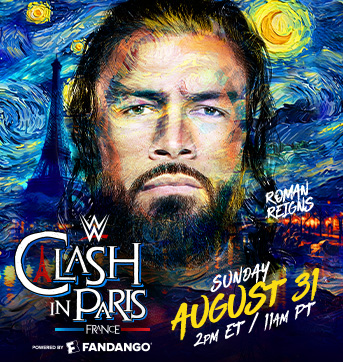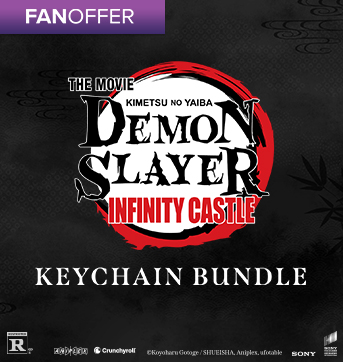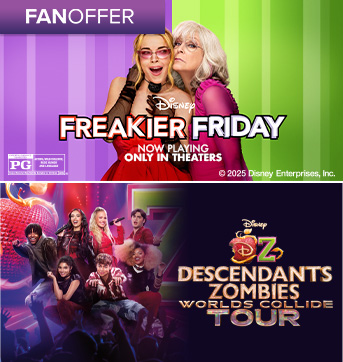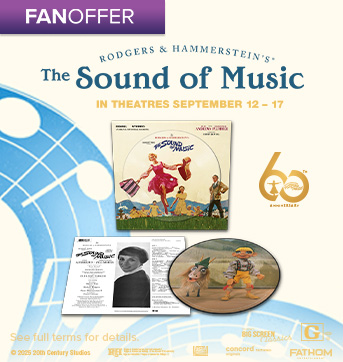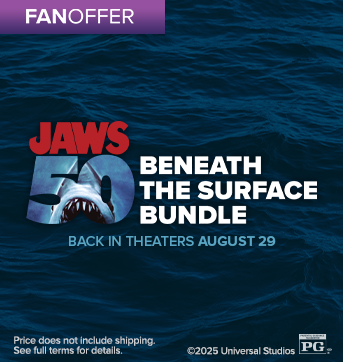Of all of the superheroes assembled for Joss Whedon’s team-up movie The Avengers, the Hulk is the one who comes with the most baggage, and yet in some ways, the one from whom audiences expect the least. After Marvel released two commercially successful but critically uneven Hulk movies, even some of the character’s biggest fans speculated whether or not he was a character who was meant for the silver screen. But for The Avengers, writer-director Joss Whedon recruited Mark Ruffalo to play both Banner and Hulk, in the process giving an acclaimed actor the chance to play in the superhero sandbox while providing a crowd-pleasing film with a performance of real depth and dimension. And now comes word that there may even be a spin-off set for 2015.
Fandango sat down with Ruffalo at the recent Los Angeles press day for The Avengers to talk about the challenge of tapping into the Hulk’s rage, quite literally. In addition to discussing the balance he needed to strike between the character’s storied legacy and an all-new interpretation, Ruffalo addressed the misperceptions of "slumming" in a superhero movie, and hinted at his interest in continuing to play the purple-panted behemoth.

Fandango: What really works about your portrayal of the character was there is the undercurrent of melancholy in Banner, and at the same time there is just a light enough touch that you don’t feel like this guy is a killjoy in the middle of the rest of the fun stuff going on. How did you find that balance?
Mark Ruffalo: It’s something that Joss [Whedon] and I really talked a lot about -- how to make Banner watchable and how to make him accessible to people. It’s hard to watch a guy who doesn’t want to be there for too long a period of time. But it felt like he’s grown up; it’s the next version of Banner after being on the run for another five years. You get to that point where you’re like, hey, this is as good as I'm going to be and I actually do have some good qualities, but I also have my shortcomings as well. But it’s time to get on with it -- and I think Banner at this point is turning to face himself. He is the more mature Banner. He is accepting the tragedy of it, but also has gotten to a point where he might be able to control it a little bit -- and he’s not going to find out who he truly is by staying in Calcutta.
I think at this moment of his life when [Black Widow] shows up, yes, it’s a pain in the ass, but it’s a calling that he was waiting for in a way. It was like a Banner who has this world-weariness - who understands the situation he’s in, who has this greatness inside of him. Could he have been Tony Stark? Tony Stark is the successful version of him. And so we wanted him to have this kind of dry, melancholy wit and this joyful participation in the sorrows of the living.
Fandango: How much of your work is done with the previous iterations of the Hulk, and how tough was it to absorb the legacy of this character and hit the ground running? It seems there’s both an opportunity and a challenge.
Ruffalo: Yeah, you’re standing on the shoulders of giants, literally, and the actors who played the part before me, I love them both. I respect them. Only technology gives me the slight edge over them, that we can do motion capture. I can play the Hulk, and that was probably the most exciting part of it to me -- if I can play both of these characters, Banner and the Hulk, then maybe I could do something great with it. Because I'm not convinced that we’ve seen the Hulk yet. Banner has been great, but we haven’t quite seen the Hulk that I want to see, and that we’re now capable of seeing.
I didn’t know there was going to be so much scrutiny of this part, before I even shot a frame of film, so that was very daunting. That scared the hell out of me. When I went to Comic-Con, half the people were like, “What?” And the other half were like, “Um, no.” It was terrifying.
Fandango: What is interesting is this was the first Hulk movie that really used your face as the Hulk’s.
Ruffalo: Yeah, well, it was a big fight. Marvel in the past did not want to use an actor’s face in the Hulk, did not want the Hulk to resemble the actor, and Joss and me were really pushing to see Banner inside this beast. There was always this disconnect when you’re watching the movie and all the sudden we’re in a CGI movie -- and it’s animation and the continuity and the just the subtlety of rage and all the different gradations of rage and all that is hard to capture in animation.

Fandango: How difficult or easy was it to make “Hulk smashing” actually scary, because that’s something that the movies haven’t really done? Because the scene with Scarlett Johansson is really powerful and effective in communicating what is successful about him, and what is still sort of scary.
Ruffalo: Yeah, you want to have them both. Joss and I were sitting and talking for hours and hours and hours about how we wanted to see the Hulk, and we both felt like there was a sense of humor that should be funny at times. It’s almost like when Frankenstein sees the little girl throwing the flowers into the water and then throws in the little girl -- it’s terrifying. It’s crazy, but we also wanted him to have a sense of humor. And even when he saves [another character], there’s a sense of pathos, but it doesn’t take away the scariness.
Fandango: With these kinds of movies, fairly or unfairly, I think people look at like actors like yourself and movies like this, and they’re like, oh, he’s doing a commercial movie so he can get five Margarets made. It’s really a contract to fill this audience’s expectations that you probably don’t have when you play a character in Margaret or Zodiac or something like that.
Ruffalo: Certainly there’s the base that wants [the Hulk they expect], but they didn’t hire me for that base. They hired me for my base, kind of. They know what they’re getting when they ask me to be in a movie, and I'm glad to be invited into this world, but to me it’s no different a job than doing Margaret or The Kids are All Right or Shutter Island. You still have make that person real, and in a lot of ways it’s harder because it’s more stylized. And there are all these tertiary benefits; I mean, it will help me get other movies made if it does really well and all that, but it has its own acting problems that are just as much a challenge as anything else. And it’s an interesting enough character with a lot going on that I still get my kicks from playing it.

Fandango: Playing the Hulk, you had the advantage of not being responsible for shouldering an entire movie or creating some iconic persona. But if people decided that they would like to see you in a Hulk movie, is that something you would be interested in?
Ruffalo: Yeah, I would be interested in seeing what that would turn out to be. I think with the right director and the right story, I think there could be another Hulk movie. I don’t know where to go with him, but there are some funny things that I see in my head. I thought it was funny that he ended up in India, and there is a lot of cool stuff you could do with the Hulk in India.
Now that I understand how the motion capture works and then seeing it actually all put together I can bring so much more to that, I think. It’s this new frontier, this whole motion capture thing. It’s really the ultimate costume, because it doesn’t impede your face or your ability to emote or your ability to perform. It’s not a prosthetic. It doesn’t block your emotions, so [we’re] able to do things that we’ve never been able to do. I've watched that and I'm like, oh my god, the possibilities are endless.

